Can dogs eat mustard? No. Mustard seeds are thought to be toxic to dogs, so they are best avoided. There is no need to feed your dog mustard.
Mustard greens, on the other hand, are thought to be safe for dogs. However, no reliable sources or vet-approved studies are confirming this. If you do want to add cruciferous vegetables to your dogs’ diet, we recommend a small amount of properly cooked broccoli, Brussels sprouts, or cauliflower.
Why can’t dogs eat mustard?
Toxic Compound – It is thought the main reason is due to the seeds containing the compound isothiocyanate, which gives it its pungent flavor. Unfortunately, this can cause gastric distress, including vomiting and diarrhea in dogs.
Other vegetables also contain isothiocyanate, such as broccoli. However, this is thought to be safe for dogs as long as it is fed in small amounts. It is recommended to keep broccoli at under 10% of your dogs’ daily food intake.
Mustard and Vomiting
There are many websites claiming a certain amount of mustard can help induce vomiting. But this is not known to be safe, effective, or recommended by vets. If you need to make your dog vomit for any reason, contact a veterinarian or the poison helpline for guidance.
Busy? Get Your Hands Paws On The Answers Quickly…
- Which Mustard Types Can Dogs Eat?
- What Should I Do If My Dog Eats Mustard?
- Can Dogs Eat Any Condiments?
- FAQs
WHICH MUSTARD TYPES CAN DOGS EAT?
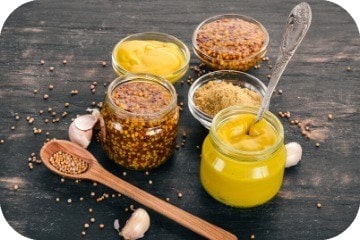
Yellow Mustard
What is it? Bright yellow with a strong, spicy flavor. It is commonly used on sandwiches, hotdogs, salads, and burgers.
Can dogs eat yellow mustard? No. Yellow mustard is made from mustard seeds, which are known to be poisonous to dogs. Other ingredients are also added to enhance the flavor, like garlic, sugar, sweeteners, and wine. All of these can be dangerous or deadly to dogs.
Dijon Mustard
What is it? Originating in France, Dijon mustard is paler and creamier than yellow mustard and is made from brown mustard seeds and wine.
Can dogs eat dijon mustard? No. Again, this is made from mustard seeds, which are dangerous to dogs. It is also made from wine, which is incredibly hazardous to dogs, not just for the alcohol content, but due to it being made of grapes, which are highly toxic.
Spicy Brown Mustard
What is it? Darker in color and thicker in consistency compared to yellow mustard, spicy brown mustard is made by soaking the seeds in vinegar. This results in a sharp flavor and intense aroma.
Can dogs eat spicy brown mustard? No. As it is made from mustard seeds and these are known to cause adverse effects on dogs. Many dogs will also be put off by the pungent smell caused by the vinegar.
Honey Mustard Sauce
What is it? A sweet, smooth, and creamy sauce, used on salads, or as a dipping sauce. It is usually thinner in consistency compared to yellow mustard. Honey mustard is made by combining honey, mayonnaise, mustard, and other flavorings.
Can dogs eat honey mustard sauce? No, due to using mustard seeds, it is not recommended for dogs.
Whole Grain Mustard
What is it? Coarse in texture, hotter in taste, with a strong flavor, whole grain mustard is made with whole seeds. The whole seeds are visible in the final mustard.
Can dogs eat whole grain mustard? No, as it is made with mustard seeds that are unsafe to dogs.
Mustard Greens
What is it? These are the greens of a mustard plant. They have a strong peppery taste and are a cruciferous vegetable. Other cruciferous vegetables include kale, bok choy, radishes, broccoli, cauliflower, and sprouts.
Can dogs eat mustard greens? Maybe. There is not much evidence indicating whether or not these are safe for dogs. There are alternative vegetables that may be safer, in moderation. Check out our post Human Foods Dogs Can, and Can’t Eat here for more advice.
WHAT SHOULD I DO IF MY DOG EATS MUSTARD?

Yellow Mustard
What is it? Bright yellow with a strong, spicy flavor. It is commonly used on sandwiches, hotdogs, salads, and burgers.
Can dogs eat yellow mustard? No. Yellow mustard is made from mustard seeds, which are known to be poisonous to dogs. Other ingredients are also added to enhance the flavor, like garlic, sugar, sweeteners, and wine. All of these can be dangerous or deadly to dogs.
Dijon Mustard
What is it? Originating in France, Dijon mustard is paler and creamier than yellow mustard and is made from brown mustard seeds and wine.
Can dogs eat dijon mustard? No. Again, this is made from mustard seeds, which are dangerous to dogs. It is also made from wine, which is incredibly hazardous to dogs, not just for the alcohol content, but due to it being made of grapes, which are highly toxic.
Spicy Brown Mustard
What is it? Darker in color and thicker in consistency compared to yellow mustard, spicy brown mustard is made by soaking the seeds in vinegar. This results in a sharp flavor and intense aroma.
Can dogs eat spicy brown mustard? No. As it is made from mustard seeds and these are known to cause adverse effects on dogs. Many dogs will also be put off by the pungent smell caused by the vinegar.
Honey Mustard Sauce
What is it? A sweet, smooth, and creamy sauce, used on salads, or as a dipping sauce. It is usually thinner in consistency compared to yellow mustard. Honey mustard is made by combining honey, mayonnaise, mustard, and other flavorings.
Can dogs eat honey mustard sauce? No, due to using mustard seeds, it is not recommended for dogs.
Whole Grain Mustard
What is it? Coarse in texture, hotter in taste, with a strong flavor, whole grain mustard is made with whole seeds. The whole seeds are visible in the final mustard.
Can dogs eat whole grain mustard? No, as it is made with mustard seeds that are unsafe to dogs.
Mustard Greens
What is it? These are the greens of a mustard plant. They have a strong peppery taste and are a cruciferous vegetable. Other cruciferous vegetables include kale, bok choy, radishes, broccoli, cauliflower, and sprouts.
Can dogs eat mustard greens? Maybe. There is not much evidence indicating whether or not these are safe for dogs. There are alternative vegetables that may be safer, in moderation. Check out our post Human Foods Dogs Can, and Can’t Eat here for more advice.
WHAT SHOULD I DO IF MY DOG EATS MUSTARD?
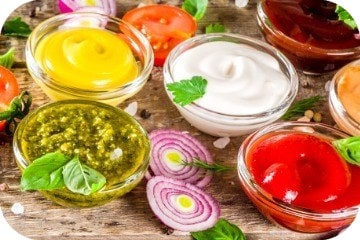
With so many condiments available, knowing which are safe for dogs is vital if you want to share your food. Many ingredients are added to condiments that can be fatal or dangerous to dogs. The main ones to avoid are:
- Garlic
- Xylitol (sugar substitute, common in low-sugar alternatives)
- Onion
- Excess sugar
- Mustard powder or seeds
Ketchup – Not really, but it usually isn’t toxic. In small amounts, ketchup is not thought to be dangerous to dogs (providing it contains no xylitol, onion, or garlic). However, it is not healthy and should not be fed regularly.
Mayonnaise – Not really, but it usually isn’t toxic. Mayonnaise isn’t thought to contain anything fatal to dogs. However, it is incredibly high in fat.
Barbecue Sauce – Not really, but it usually isn’t toxic. Depending on the ingredients, BBQ sauce may be ok for dogs in small amounts. However, it usually contains high levels of sugar and salt, which are not healthy. It may also be flavored with onion and garlic, which can be dangerous. Avoid feeding it your dog.
Garlic Mayonaise – No. As well as the hazard of fat in the mayo, garlic is harmful to dogs and should never be given. If your dog has consumed garlic, contact the veterinarian immediately.
Salsa – No. Salsa usually contains onions and garlic, both of which are poisonous to dogs.
Guacamole – No. Avocado is not generally recommended for dogs due to the level of persin (although this is more present in the skin, pip, and plant). Guac also contains garlic and onion, both of which are dangerous to dogs.
Hot Sauce – Not really, but it isn’t usually toxic. Hot food can cause gastric upset in dogs. Most dogs do not like the taste of hot and spicy food. It is commonly used as a deterrent for dogs, like vinegar. Avoid feeding it to your dog.
Horseradish – No. There is limited research on horseradish and dogs. The vegetable isn’t thought to be toxic. However, the dressing usually contains garlic, chives, mustard, and other flavorings which could be fatal.
Pesto – No. Garlic is one of the main ingredients of pesto; this is highly unsafe to dogs and should be avoided.
Soy Sauce – Not really. Soy sauce is incredibly high in salt and can cause salt poisoning and kidney damage. Make sure there is water available if your dog has eaten any high salt foods and contact a vet if you notice any unusual behavior.
Hummus – No. Hummus contains a significant amount of garlic, which is unsafe for dogs. For more information, check out our article Can Dogs Eat Hummus here.
FAQS

Can dogs have tuna fish with mayo?
Maybe, neither are usually fatal to dogs, but are not the healthiest option either. Tuna is high in mercury, which, when consumed in high amounts, can cause severe health issues. Mayo is high in fat and not a recommended ingredient for dogs. Try some plain, cooked, boneless salmon or chicken as an alternative.
Can a jalapeno kill a dog?
We do not recommend feeding dogs any spicy foods. Jalapenos aren’t thought to be toxic to dogs but can have some side effects, such as gastric upset. Contact your veterinarian if you are concerned, or your dog is acting differently.
Looking for more pawsome posts? Check these out…
Human Foods Dogs Can and Can’t Eat
How To Make A Snuffle Mat
When Do Puppies Lose Their Teeth?
Quick, Cheap, and Easy Dog Treats
Can Dogs Get Chickenpox?
Disclaimer: Each dog is different, and every circumstance is different. All efforts have been made to provide accurate information. However, it is not provided by a qualified Veterinarian, Veterinarian Surgeon, or Behaviorist. The information provided is purely educational. The information should not be used as an alternative or substitute for medical care. If you have any health or medical concerns, contact a qualified Veterinary Surgeon or Veterinarian immediately.
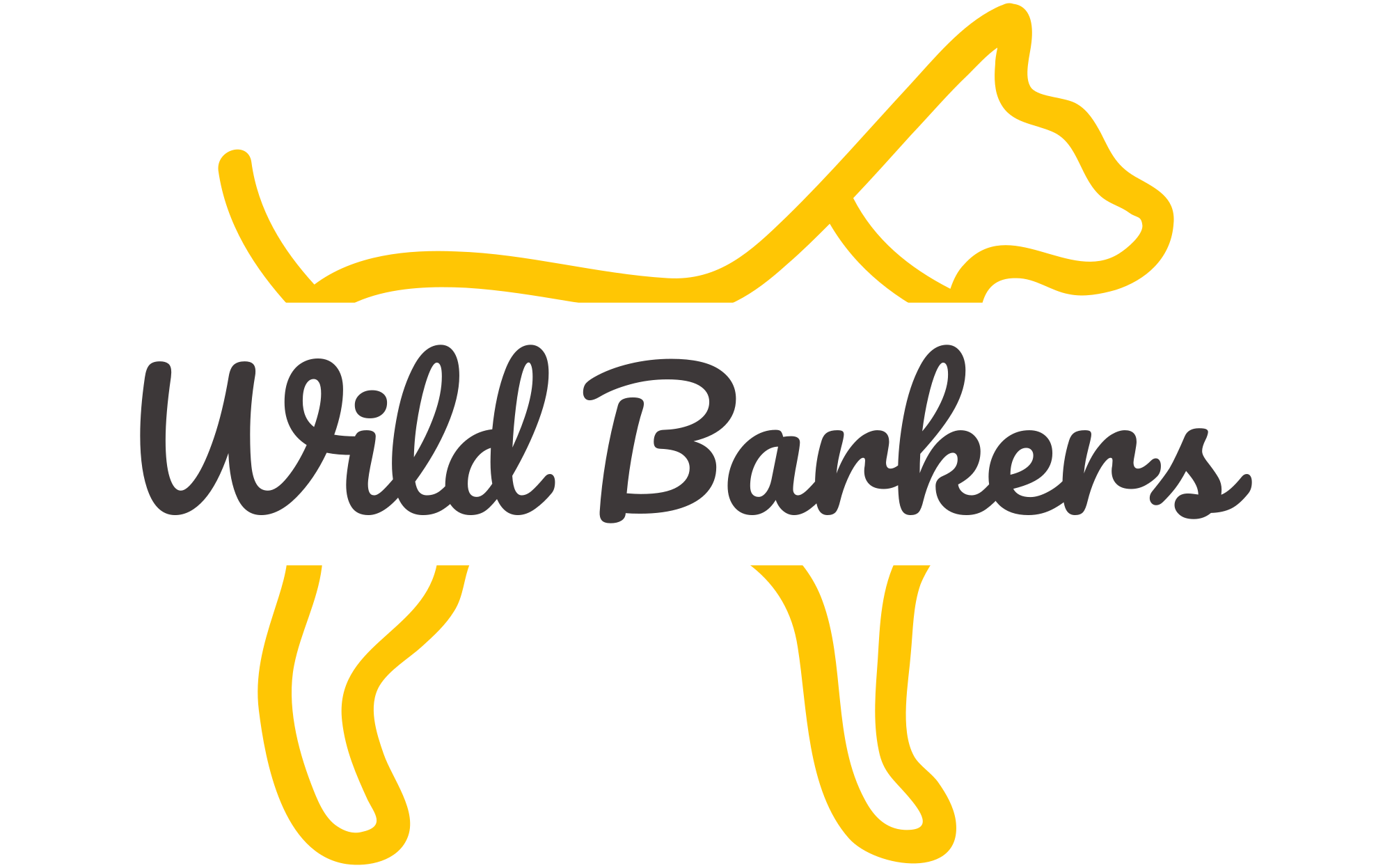




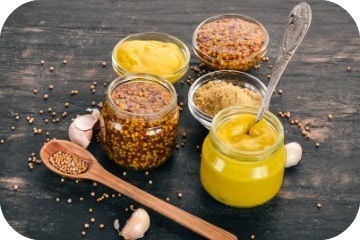
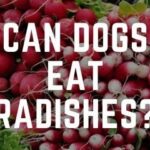
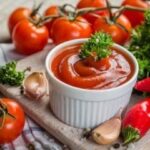

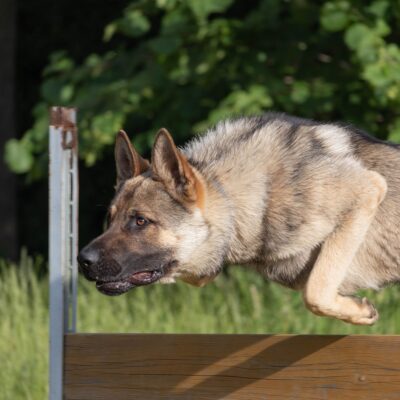
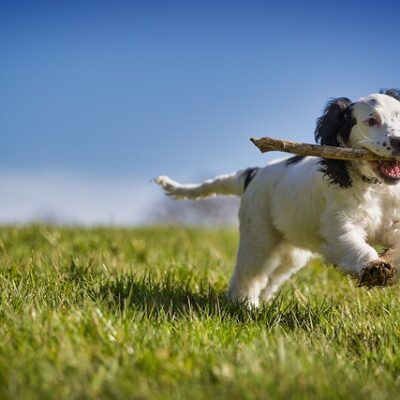
No Comment! Be the first one.